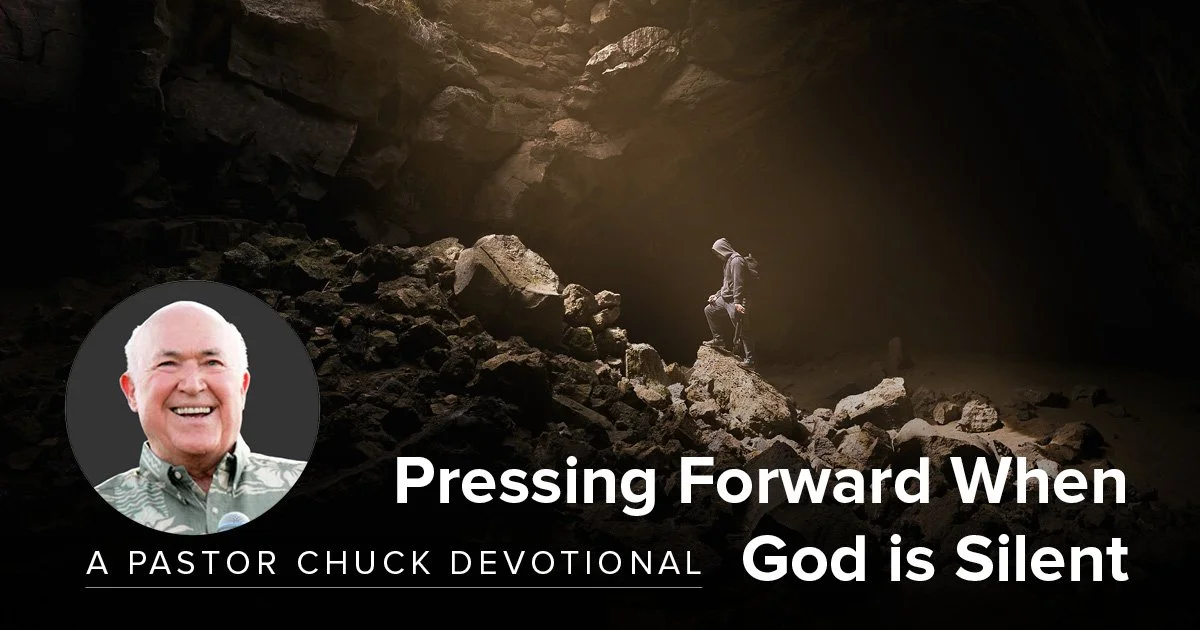A Pastor Chuck Devotional
Pressing Forward When God is Silent
Originally published in print Issue 83 of Calvary Chapel Magazine
Jesus often rebuked people for their lack of faith, but it is notable in Matthew 15 that He didn’t chide the non-Jewish mother who came to Him desperate for the healing of her demon-possessed daughter. In fact, by the end of the encounter, Jesus proclaimed that she had great faith—but she had to overcome a great deal to hear that description.
First, she came to Jesus despite Jewish prejudice. Second, she persevered against the silence of Jesus. Third, she proceeded against exclusion. And finally, she won against a rebuff.
Prejudice & Non-Association
The Jews would not marry outside of their religion, in accordance with God’s Law (Deuteronomy 7:3; Acts 10:28). They often would not mix with people of other races. This Gentile woman came to Jesus against this backdrop of sharp, racial distinction. She was so driven to find relief for her daughter that she came despite severe prejudice. When she heard that Jesus had arrived in her area, she looked beyond this historical non-association and saw hope.
Silence
A second obstacle proved even more difficult. When this woman cried out to Jesus and said, “Have mercy on me, O Lord, Son of David!” (22b), Jesus did not answer her a word (23a). His silence must have been excruciating for her. Yet she didn’t give up.
The silence of God can be discouraging. Many people will despair and turn away. Not this woman. She could have heard a “no” response in the silence of Jesus but instead hoped for a “yes.” It’s interesting that she had more hope in the silence of Jesus than we often have in the promises of Jesus.
Sometimes God’s silence is just a matter of timing. It isn’t that He has no intention of answering our prayers. Perhaps He first wants to work a few things out in us. Maybe He is seeking to draw us out, just as His responses drew out this woman’s expression of faith. Don’t give up. Press in for God’s help. Before long, you’ll see God at work.
(Sponsor message: Learn how you can receive a top-tier educational degree from a totally biblical perspective at the fully accredited Calvary Chapel University, which is 100% online). 
Exclusion
The woman also continued to pursue Jesus despite feeling excluded. Within earshot of the woman, Jesus said to His disciples, “I was not sent except to the lost sheep of the house of Israel” (24b), pointing out that this woman—a Syrophoenician from Canaan—was outside of God’s covenant with the Jews. It must have hurt to hear those words, but she wasn’t deterred. Persevering, she came and worshiped Him, saying, “Lord, help me!” (25).
A lot of people become discouraged in asking requests of God in prayer and say, “I know I don’t deserve [an answer]. I shouldn’t even ask.” This woman didn’t come to Jesus because she felt qualified. She didn’t come saying, “Lord, I want justice.” Only a fool would say that! She came saying, “Lord, I need mercy.” Her appeal was not based on her own merit—it was based on the mercy of Jesus, and so she continued to press Him. Like this woman, we don’t come to the Lord because we deserve His blessings or goodness. We come because God is gracious and merciful, willing to give us the good we don’t deserve.
Rebuff
When this woman again asked Jesus for His help, He turned to her and said, “It is not good to take the children’s bread and throw it to the little dogs” (26b). If we had no understanding of the Greek language, we might get upset with Jesus at that comment. But the word He used there was a Greek term that could better be translated “little puppies.” Many non-Jewish households had a little puppy waiting at the table to receive the extra bread the children tossed to them.
In Jesus’ softened response tailored to her understanding, this woman saw an open door. “That’s right, Lord, I agree,” she said. “Yet even the little dogs eat the crumbs which fall from their masters’ table” (27b). That’s when Jesus said, “O woman, great is your faith! Let it be to you as you desire” (28b). She had broken through and overcome. Her daughter was healed from that very hour (28c).
How Jesus Encourages Faith
From the moment the woman came to Him, Jesus knew He was going to heal her daughter. The truth is, He acted as He did to draw out her faith to its fullest expression. His method tested her faith, to be sure, but it also gave her the opportunity to express it to its greatest measure.
Every time He took a step back, she took a step forward. He intended to draw her into the closest, most intimate relationship of faith possible—for her, yes, but also to encourage the people around her. After Jesus healed her daughter, we read: Then great multitudes came to Him (on a mountain near the Sea of Galilee), having with them the lame, blind, mute, maimed, and many others; and they laid them down at Jesus’ feet, and He healed them (30). Her faith opened the door for her daughter’s healing and also for the work of the Lord in that region.
Oh, the power of prevailing prayer! It not only meets your needs, but it also opens the door for others to enter in and to receive the mercy and the grace of God.
(To learn more about Calvary Chapel University, visit their website or read our past coverage on the school)

All verses above are quoted from the New King James Version, unless otherwise noted.
© 2022 Calvary Chapel Magazine (CCM). All rights reserved. Articles or photographs may not be reproduced without the written permission of CCM. All Scripture quotations, unless otherwise indicated, are taken from the New King James Version. Copyright © 1982 by Thomas Nelson, Inc.® Used by permission.


